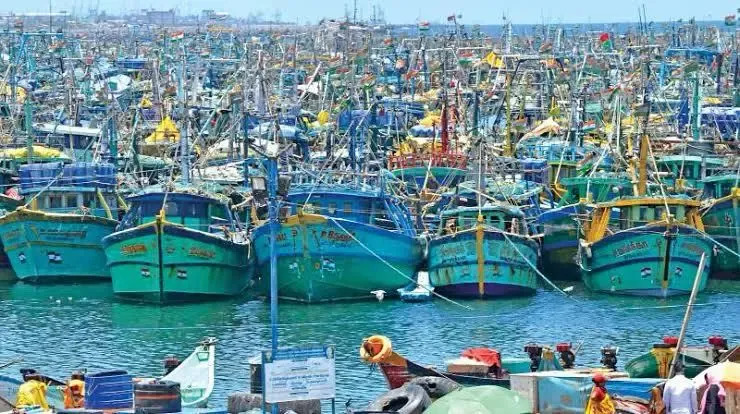Tamil Nadu's 61-Day Fishing Ban Commences; Fishermen Call for Vigilance Against Illegal Trawling

Synopsis
Key Takeaways
- 61-day fishing ban in Tamil Nadu started on April 15.
- Implemented to protect marine biodiversity during breeding season.
- Over 1,500 mechanised vessels anchored along the coast.
- Urgent call for enhanced coastal surveillance against illegal fishing.
- Financial relief of ₹8,000 for each registered fisherman.
Chennai, April 15 (NationPress) The 61-day annual fishing ban along the coast of Tamil Nadu commenced in the early hours of Tuesday and is set to last until June 14.
This ban, enforced under the Tamil Nadu Marine Fishing Regulation Act, 1983, is designed to safeguard marine biodiversity during the critical breeding season.
During this timeframe, mechanised boats and trawlers are prohibited from entering the sea.
As per the Ramanathapuram district administration, approximately 1,500 mechanised vessels have been anchored at various coastal jetties, including 809 boats in Chennai alone.
In Thoothukudi district, over 550 mechanised boats at the Thoothukudi, Tharuvaikulam, and Vembar fishing harbours will remain onshore.
Fishermen leaders have urged the Tamil Nadu government to enhance coastal surveillance to combat illegal fishing during the ban.
They have requested the deployment of the Indian Coast Guard and the state’s marine police to monitor the waters and identify violators.
“We must ensure no unauthorised fishing occurs, particularly by boats from Kanniyakumari or Kerala. The fisheries department must stay vigilant,” stated Pugal, Secretary of the Deep Sea Fishermen Welfare Association.
Traditional country boats, however, are permitted to operate during this ban in Tamil Nadu.
Officials have cautioned fishermen against venturing into Andhra Pradesh waters, where a complete fishing ban, including on traditional crafts, is currently enforced.
“There have been previous instances where our fishermen faced assaults and had their equipment confiscated by locals in Andhra Pradesh. We must prevent such confrontations,” a state fisheries department official remarked.
To assist affected fishermen, the Tamil Nadu government has announced financial relief of ₹8,000 for each registered fisherman. Boat owners can utilize this period for vessel maintenance and repairs.
Meanwhile, there are increasing demands from the fishing community for enhanced compensation, citing inflation and rising prices of goods.
N.J. Bose, leader of the All Mechanised Boat Fishermen Association, reiterated the necessity for a resolution regarding the long-standing Katchatheevu issue before the ban concludes.
Prior to the ban, fish prices escalated at markets statewide.
On Sunday, the Kasimedu fishing harbour in Chennai experienced high demand and soaring prices: Seer fish (vanjaram) sold at ₹900–₹1,000 per kg, white pomfret (vellai vavval) at ₹1,100 per kg, red snapper (sankara) at ₹500–₹600 per kg, and sardines (mathi) at ₹100–₹120 per kg.
With local fishing halted, markets will typically source fish from neighboring states such as Kerala and Karnataka. Consumers are also anticipated to visit coastal hamlets to purchase directly from traditional fishermen as they return with their catch.








